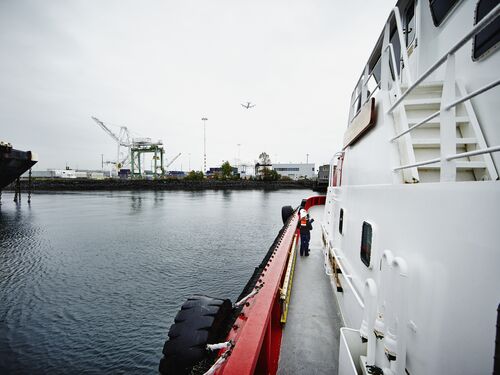Finalists Announced for $50 Million Award to Support a Safer, More Resilient, and Sustainable Future for the Gulf Coast Region
News Release
By Pete Nelson
Last update September 9, 2025
AdobeStock_322123924.jpeg
WASHINGTON — The National Academies of Sciences, Engineering, and Medicine’s Gulf Research Program and Lever for Change announced today 10 finalists for the $50 million Gulf Futures Challenge. These finalist projects are a collection of bold ideas that apply, translate, and communicate science, engineering, and medical knowledge to address critical challenges in the Gulf Coast region.
Representing all five Gulf states, these 10 projects present creative visions for tackling the urgent challenges of energy security, environmental change, and community well-being, each through a distinct, locally grounded approach. The projects are united by a common goal of creating safer and more resilient communities where people in the Gulf can live, work, and thrive. From addressing flooding to repurposing decommissioned wind turbines, together, they are demonstrating how science can drive practical, people-centered solutions to today’s most pressing challenges.
“The Gulf Futures Challenge finalists exemplify the bold thinking and community-rooted innovation needed to navigate the complex transitions facing our environment, economy, and public health,” said Lauren Alexander Augustine, executive director of the Gulf Research Program. “We are proud to support their efforts and see them continue to build their ideas into action.”
The 10 finalists’ projects are listed below in alphabetical order:
Architected Materials for Extreme Resistance in Coastal Applications (AMERICA): The University of Florida’s AMERICA project offers a new method to protect the Gulf Coast and offshore energy facilities by dissipating wave energy, while rejuvenating marine habitats through advanced materials, additive manufacturing, and autonomous assembly for rapid, effective deployment.
Community Co-Financed Flood and Energy Resilience (CCOFFER): Louisiana State University’s CCOFFER — in partnership with Community Foundation of Southwest Louisiana, Green Coast Enterprises, National Community Stabilization Trust, Argonne National Laboratory, and Texas A&M University — will engage four Gulf communities on the increasing challenges of flooding and electricity insecurity, planning needed mitigation infrastructure, and developing innovative financing tools.
Community Lighthouse: A Model for Neighborhood-Led Resilience: Greater New Orleans Foundation, Together Louisiana, and Louisiana State University School of Social Work’s Community Lighthouse project will equip trusted institutions with solar and battery microgrids, saving lives in outages and rebuilding trust. The project will expand to 80 hubs and link them as a Virtual Power Plant, changing how the grid operates.
Gulf Resilience and Excellence Hub (Gulf Hub): The Louisiana Public Health Institute’s Gulf Hub — in partnership with Crescent Care, Louisiana State University School of Public Health, University of Miami, Miller School of Medicine, Global Institute, State (LA, MS, AL, FL) Primary Care Associations, Southern University, and Miller M. Charles School of Social Work — will transform Community Health Centers into Resilience Hubs, serving 400,000 people in Louisiana, Mississippi, Alabama, and Florida through impact of disasters and disruptions, while building research capacity to understand community and health care resilience.
Iberia Parish Clean Energy Hub: Climate, Community, and Workforce Innovation: Louisiana State University, University of Louisiana, Digital Twin Studios LLC, Betaversity LLC, and Do-it-Greener Foundation’s project will establish a clean energy hub integrating solar, agrivoltaics, carbon capture, and workforce training with digital twin simulations to enhance climate resilience, environmental restoration, and economic opportunity for underserved communities.
Per- and Polyfluoroalkyl Substances (PFAS) Solutions: GeoHealth Intelligence and Human-Centered Design for Gulf Sustainability: Mississippi State University, Mississippi Commercial Fisheries United, United States Geological Survey, University of Southern Mississippi, and United States Department of Agriculture’s PFAS Solutions project will co-develop tools to monitor PFAS chemicals’ impact on aquatic and human health in the Gulf Coast, supporting early detection, restoration methods, and creating a public database for water quality and marine health management.
Ready to Adapt: Building the Rural Working Coast through Design: Partnering with a rural working coast community, Auburn University will develop integrated resilient housing and natural infrastructure for the rural working Gulf Coast by designing and building community-based demonstration projects and creating a scalable adaptation toolkit to promote regional prosperity.
Renewable Energy for Sustainable, Continuous, Uninterrupted Ecosystems (RESCUE): The University of Texas Rio Grande Valley, NVTX Energy, Oak Ridge National Laboratory, EDF Renewables, Cameron County, Texas, and Deriva Energy’s RESCUE project will utilize battery energy storage systems in underserved and economically disadvantaged communities of the Rio Grande Valley to achieve its goals at the intersection of resilient communities, energy transition, and environmental change.
Repurposing Petroleum Infrastructure for Sustainable Energy, Food, and Critical Minerals: The Gulf Offshore Research Institute — in partnership with the Harte Research Institute, Blue Latitudes LLC, University of Southern Mississippi, University of Houston’s ROICE Program, and Gulf Trust — will research and demonstrate the repurposing of idle offshore oil and gas infrastructure to conserve marine habitat and enable a transition to green hydrogen, open ocean aquaculture, continuous data acquisition, and critical mineral harvesting.
Upcycling Wind Turbine Blades: Enhancing Coastal Community Resilience and Health: University of Houston, Tulane School of Architecture, Tulane University, School of Public Health, University of Texas Health Science Center at Houston, City of Galveston, Texas, EMC Services Inc., and EDP Renewables North America’s project will repurpose decommissioned wind turbine blades to build coastal structures that advance the resilience and health of Gulf coastal communities through research, education, and outreach.
The Gulf Futures Challenge received 164 applications from organizations based in Alabama, Florida, Louisiana, Mississippi, and Texas. Each entry was subject to participatory reviews and multiple rigorous evaluations by experts from science, engineering, and medicine. The finalists collectively represent all five states along the Gulf Coast and were selected based on four key criteria: whether they were impactful, bridging knowledge to action, innovative, and inclusive in their proposed approaches.
Each of the 10 finalist teams will receive an initial project development grant of $300,000 and technical assistance to strengthen their proposals. After submitting revised applications, two finalists will be awarded $20 million each to implement their solutions. The remaining eight will be eligible for up to $875,000 in additional project development support.
“The broad range of projects reflected in these bold proposals demonstrate the power that science, engineering, and medicine can bring to drive transformative change in the Gulf,” said Marcia McNutt, president of the National Academy of Sciences. “The work of these teams will not only advance solutions, but also build a more resilient and durable future for Gulf communities.”
The Gulf Futures Challenge is managed by Lever for Change, a nonprofit affiliate of the John D. and Catherine T. MacArthur Foundation that leverages its networks to help donors find and fund bold solutions to the world’s biggest problems. All 10 finalist proposals will be added to Lever for Change’s network, which offers ongoing learning and networking opportunities to expand the impact of their work, raise their visibility, and increase their potential to secure funding.
“Research in motion drives theory into practice and delivers lasting solutions,” said Kristen J. Molyneaux, president of Lever for Change. “These 10 teams reflect the ingenuity and determination of the Gulf region, and we are honored to help amplify their visions for a healthier, more sustainable future.”
More information about the Gulf Futures Challenge and the finalists can be found at https://leverforchange.org/open-calls/gulf-futures-challenge/
The National Academies of Sciences, Engineering, and Medicine & Gulf Research Program
The National Academies of Sciences, Engineering, and Medicine are private, nonprofit institutions that provide independent, objective analysis and advice to the nation to solve complex problems and inform public policy decisions related to science, engineering, and medicine. The National Academies operate under an 1863 congressional charter to the National Academy of Sciences, signed by President Lincoln. For more information, visit nationalacademies.org/about.
The National Academies’ Gulf Research Program (GRP) is an independent, science-based program founded in 2013 as part of legal settlements with the companies involved in the 2010 Deepwater Horizon disaster. The GRP’s mission is to develop, translate, and apply science to enhance the safety of offshore energy, the environment, and the well-being of the people of the Gulf region for generations to come. It supports innovative science, guides data design and monitoring, and builds and sustains networks to generate long-term benefits for the Gulf region and the nation. Visit nationalacademies.org/gulf/gulf-research-program to learn more.
Lever for Change
Lever for Change is a nonprofit affiliate of the MacArthur Foundation that creates equitable access in the world of philanthropy, enabling donors to discover and invest in organizations with transformative potential. Through an inclusive open call approach, the team invites organizations of all sizes from around the world to showcase their big ideas and receive donor funding and resources to make them happen. To date, Lever for Change has influenced over $2.5 billion in grants and worked with more than 500 organizations worldwide. Discover new potential at leverforchange.org.
Contacts:
Pete Nelson
Director of Communications, Gulf Research Program
National Academies of Sciences, Engineering, and Medicine
PNelson@nas.edu; 202-334-3989
Angie Ngo
Lever for Change
media@leverforchange.org
More like this
Events
Right Now & Next Up
Stay in the loop with can’t-miss sessions, live events, and activities happening over the next two days.
NAS Building Guided Tours Available!
Participate in a one-hour guided tour of the historic National Academy of Sciences building, highlighting its distinctive architecture, renowned artwork, and the intersection of art, science, and culture.



